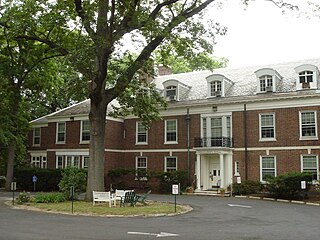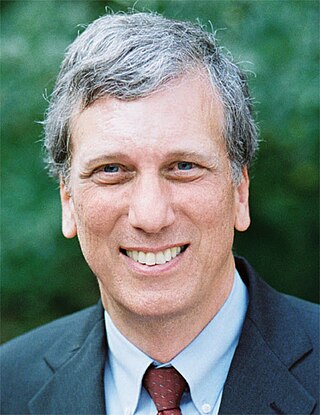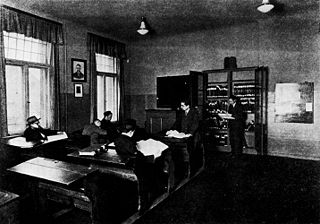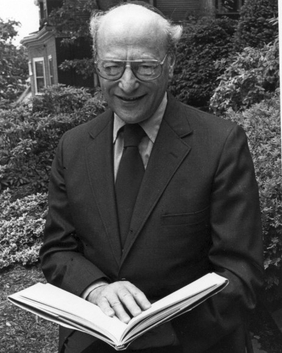A rabbi is a spiritual leader or religious teacher in Judaism. One becomes a rabbi by being ordained by another rabbi—known as semikha—following a course of study of Jewish history and texts such as the Talmud. The basic form of the rabbi developed in the Pharisaic and Talmudic eras, when learned teachers assembled to codify Judaism's written and oral laws. The title "rabbi" was first used in the first century CE. In more recent centuries, the duties of a rabbi became increasingly influenced by the duties of the Protestant Christian minister, hence the title "pulpit rabbis", and in 19th-century Germany and the United States rabbinic activities including sermons, pastoral counseling, and representing the community to the outside, all increased in importance.

The Jewish Theological Seminary (JTS) is a Conservative Jewish education organization in New York City, New York. It is one of the academic and spiritual centers of Conservative Judaism and a center for academic scholarship in Jewish studies. The Jewish Theological Seminary Library is one of the most significant collections of Judaica in the world.
Jewish studies is an academic discipline centered on the study of Jews and Judaism. Jewish studies is interdisciplinary and combines aspects of history, Middle Eastern studies, Asian studies, Oriental studies, religious studies, archeology, sociology, languages, political science, area studies, women's studies, and ethnic studies. Jewish studies as a distinct field is mainly present at colleges and universities in North America.

The Chicago Theological Seminary (CTS) is a Christian ecumenical American seminary located in Chicago, Illinois, and is one of several seminaries historically affiliated with the United Church of Christ. It is the oldest institution of higher education in Chicago, originally established in 1855 under the direction of the abolitionist Stephen Peet and the Congregational Church by charter of the Illinois legislature.

The Reconstructionist Rabbinical College (RRC) is a Jewish seminary in Wyncote, Pennsylvania. It is the only seminary affiliated with Reconstructionist Judaism. It is accredited by the Commission on Higher Education of the Middle States Association of Colleges and Schools. RRC has an enrollment of approximately 80 students in rabbinic and other graduate programs.
Clinical Pastoral Education (CPE) is education to teach spiritual care to clergy and others. CPE is the primary method of training hospital and hospice chaplains and spiritual care providers in the United States, Canada, Australia and New Zealand. CPE is both a multicultural and interfaith experience that uses real-life ministry encounters of students to improve the care provided by caregivers.
Martin Luther University College, formerly Waterloo Lutheran Seminary, is a seminary of the Evangelical Lutheran Church in Canada federated with Wilfrid Laurier University, located in Waterloo, Ontario.

Arnold M. Eisen is an American Judaic scholar who was Chancellor of the Jewish Theological Seminary in New York. He stepped down at the end of the 2019-2020 academic year. Prior to this appointment, he served as the Koshland Professor of Jewish Culture and Religion and chair of the Department of Religious Studies at Stanford University. Prior to joining the Stanford faculty in 1986, he taught at Tel Aviv University and Columbia University.
Reuven Pinchas Bulka was a Canadian rabbi, writer, broadcaster, and activist. He was the spiritual leader of Congregation Machzikei Hadas in Ottawa from 1967, first as Rabbi and then, starting in 2015, as Rabbi Emeritus. He served as co-president of the Canadian Jewish Congress from 2007 to 2009. Bulka's work with Kind Canada led to the recognition of the third week of February every year as "Kindness Week" in Canada.

The Hildesheimer Rabbinical Seminary was founded in Berlin on 22 October 1873 by Rabbi Dr. Israel Hildesheimer for the training of rabbis in the tradition of Orthodox Judaism.

The New York Theological Seminary (NYTS) is a private non-denominational Christian seminary in New York City. It was founded in 1900 as the Bible Teacher's College.

Gratz College is a private Jewish college in Melrose Park, Pennsylvania. The college traces its origins to 1856 when banker, philanthropist, and communal leader Hyman Gratz and the Hebrew Education Society of Philadelphia joined to establish a trust to create a Hebrew teachers college. Gratz is a graduate college located in a suburban setting, with fully online courses.
John Henry Morgan is the Karl Mannheim Professor of the History and Philosophy of Social Sciences at the Graduate Theological Foundation, where he also served as president until 2013. A prolific author, his academic work has explored the intersection of theology, philosophy, psychology and culture.

Nahum Mattathias Sarna was a modern biblical scholar who is best known for the study of Genesis and Exodus represented in his Understanding Genesis (1966) and in his contributions to the first two volumes of the JPS Torah Commentary (1989/91). He was also part of the translation team for the Kethuvim section of the Jewish Publication Society's translation of the Bible, known as New Jewish Publication Society of America Version.
Jonathan Rosenbaum is an American scholar, college administrator and rabbi; president of Gratz College. from 1998 to 2009; president emeritus of Gratz College and a visiting scholar at the University of Pennsylvania, since 2009. He is a specialist in Biblical history, the paleography and epigraphy of ancient Semitic languages, and American Jewish history.
Tamara Ruth Kolton is an American non-denominational rabbi and clinical psychologist. She was the first person ordained as a member of the Humanistic Jewish movement. Over time, her religious position evolved from agnosticism to a more spiritual perspective that drove her away from Humanistic Judaism. Kolton later became known for her controversial feminist reinterpretation of the Biblical Eve, which has received both support and criticism from other religious and spiritual writers.
Alon Goshen-Gottstein is a scholar of Jewish studies and a theoretician and activist in the domain of interfaith dialogue. He is founder and director of the Elijah Interfaith Institute since 1997. He specializes in bridging the theological and academic dimension with a variety of practical initiatives, especially involving world religious leadership.
Einat Ramon was the first Israeli-born woman to be ordained as a rabbi. She was also the first woman and the first sabra to head a Conservative rabbinical school, specifically the Schechter Rabbinical Seminary in Jerusalem, where she was dean from 2005 to 2009. Since 2011 she no longer identifies as a rabbi, heads the Marpeh training program for spiritual caregivers in Jerusalem, and teaches modern Jewish thought and Jewish feminism at the Schechter Institute.

Pamela Cooper-White is the Christiane Brooks Johnson Professor Emerita and Dean Emerita of Psychology and Religion at Union Theological Seminary in New York.









